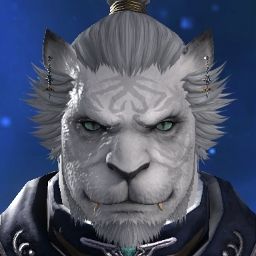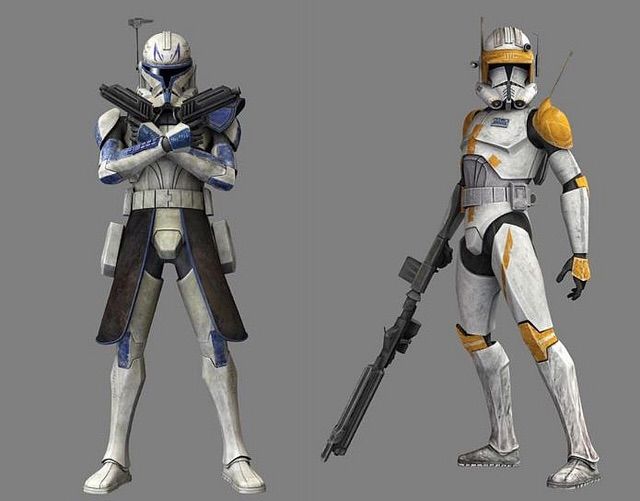Thread: Dark Knight Megathread
-
10-02-2021 04:27 AM #341(2)
Last edited by Aword3213; 10-02-2021 at 04:30 AM.
-
10-02-2021 04:32 AM #342
-
10-02-2021 05:01 AM #343
-
10-02-2021 05:08 AM #344Player

- Join Date
- Aug 2013
- Posts
- 1,835
- Character
- Vespereaux Vaillantes
- World
- Exodus
- Main Class
- Paladin Lv 91
Using the clone troopers from the Star Wars fictional universe isn't a very good comparison or analogy here.
Clones by definition are organisms that were propagated from the same genetic parent/source and are genetically identical, as the clone troopers are.
For DRK to fit the concept of being a clone of WAR, concept since clone/cloning technically has to do with biology, they would have had to do a direct copy and pasting of the code for the WAR job and then name that exact copy DRK; so therefore all the same abilities, game-play loops, etc. Everything would be an exact duplicate, not just have noticeable similarities in some aspects.
The differences that are highlighted in your post between different clone troopers is more akin to different WAR players being at different levels, having different gear and the human players behind the WAR characters having different experience levels and different play-styles and strategies.
So one could argue that all the WARs in the game are clones, seeing as how they are at the most foundational level exactly the same, but saying DRK is a clone of WAR is not factual.
The way that people are using the term "clone", as well as the term "carbon copy", is in a vernacular manner which leans heavily into casual speak's penchant for the hyperbolic, such as in commonly used phrases like "I had the worst day today". Is it literally and factually the "worst" day ever, or even in the speakers lifetime? Very likely not, but it is this vernacular use of hyperbolic and non-literal meaning to this and such words which are a vehicle to convey the speakers feelings on the level of or severity of what they are speaking about.
So when someone says that DRK is a clone or carbon copy of WAR, they are leveraging the use of hyperbole to emphasize what they feel is the severity of how similar the two jobs are, basically trying to convey that they feel that the jobs are "so similar they might as well be clones".
These linguistic flourishes are incredibly common, maybe even to the point of being more common than the definitive and literal usage of words, that seeing or hearing them being used is understandable; however, at the same time they are based in hyperbole and purposefully so.(0)Last edited by TouchandFeel; 10-02-2021 at 05:33 AM.
-
10-02-2021 05:59 AM #345Player

- Join Date
- Apr 2015
- Location
- arcadis
- Posts
- 2,067
- Character
- Shao Kuraisenshi
- World
- Ragnarok
- Main Class
- Gunbreaker Lv 90
And here i feel is where language diferences rock in, im not familiar if the english term of "clon" is used exclusively as you say as the organism definition witch is the same overhere but here is used too as a technological process of create a hardware/software to work the same way like another system wich can fit in to a great degree on the definition of what happen to DRK and current situation considering the whole blackblood sytem and the GCD pace of DRK rework in SHB and thats go to the star wars reference i tried to make, considering they operate exactly the same most of the time and have small windows or moments to show some diferences apart of they animations is where i consider the clone army could have been a nice comparison aka same base but since they are still individuals they are not exactly the same at the end but they have huge similarities based bcs they are born as clones.
That's way i never consider the term clon an hyperbole and was a perfect way to define the current problem betwen both jobs in a technological matter since DRK rework suffered cloning from WAR desing systems to a certain point but i understand it's don't necessarily have the same meaning strenght overthere, i will remember it.(1)Last edited by shao32; 10-02-2021 at 06:02 AM.
-
10-02-2021 06:27 AM #346Player

- Join Date
- Mar 2015
- Location
- Ul'dah
- Posts
- 425
- Character
- Tuya Bayaqud
- World
- Balmung
- Main Class
- Bard Lv 52
Thanks for proving my point. To even insinuate that tanks and healer damage rotations are as complex as a dps job is only justificable if you go the strawman route and is as ridiculous a my sarcastic remark. You should read your own quotes first before mentioning others.
Of course most jobs depend on pressing buttons on a certain order, thats the basic of the game. The only jobs that doesnt do that on their dps rotation are the healers because they literally have a 1 button rotation(5)Last edited by Bhearil; 10-02-2021 at 06:37 AM.
-
10-02-2021 06:37 AM #347
Eh, Straw Man Fallacy again. I never even suggested that tanks are as "complex" as DPS (complex is very subjective as I think they are straight foward and not really complex at all). I answered to what you have said and I quote:
"spam normal combo, refresh your permabuffs when needed and hog as much resources as possible for the burst window where you throw everything you can, then go back to base combo and start again"
Which is as Samurai is played. Spam normal combo, refresh buffs (kasha, yukikaze etc.), hog resources for the burst window (Kenki, meditation) and then you throw everything then go back to base combo and start again. That's how most jobs play. If by complex you mean that DPS have more buttons to press, then yes - you can call them more complex. But what you said is not complex mechanic, it's base mechanic of many jobs.
And if you want to go "No, you" route after that then please don't since I see that we have to agree to disagree and move on.(0)
-
10-02-2021 06:45 AM #348Player

- Join Date
- Mar 2015
- Location
- Ul'dah
- Posts
- 425
- Character
- Tuya Bayaqud
- World
- Balmung
- Main Class
- Bard Lv 52
If you compare a job with 3 different combos and almost every skill oriented to deal damage and/or give resources to give so against a job with a single combo and far less combat options sorry but either you are trolling or you have trouble counting.
"Samurai is played. Spam normal combo, refresh buffs (kasha, yukikaze etc.), hog resources for the burst window (Kenki, meditation) and then you throw everything then go back to base combo and start again. That's how most jobs play." Thats the perfect example of a strawman, because you are stating the obvious to a exagerated level, This is getting quite embarrasing... for you, seems you read the strawman definition on wikipedia and took a liking to it....(5)
-
10-02-2021 06:53 AM #349Player

- Join Date
- Aug 2013
- Posts
- 1,835
- Character
- Vespereaux Vaillantes
- World
- Exodus
- Main Class
- Paladin Lv 91
I wasn't saying that clone only refers to biological organisms, although it's predominant definition does, the word or term clone or cloning has expanded in usage beyond solely biological constraints and is now often used interchangeably with the word copy, especially when you are creating an exact duplicate of something. But it's etymology and therefore the foundation of it's definition which provides the context to then understand its more derivative usages is from biology, specifically coming from the Greek word klon which means "twig", "shoot", etc where the plant physiologist Herbert J. Webber came up with the term to describe the process of plant propagation through taking cuttings from a parent plant and then growing that cutting into a full blown new plant that is an exact genetic copy of the parent.
The point being that no matter what the word clone is being used to describe, due to it's origin it contextually defines the clone as being made from the exact same foundational building blocks as the parent from which it was cloned, genetic material in the case of a biological lifeform or code in the case of software. Because DRK is not literally a direct copy of WAR at a code level, it isn't literally a clone of WAR; therefore the usage of the word clone as it is being used here in the WAR/DRK comparison in question, it is being used in a hyperbolic manner like I described.
In the end it is really a semantics argument, but one that I bring up because people are defending the semantics of their non-literal, hyperbolic usage as if it weren't such. Mainly I just want people to think more on the nuances of the words and language they are using to communicate because far too often they get bent or twisted in a way that causes confusion or conflict and if the internet could use more of anything, it would be clear and concise communication.(0)Last edited by TouchandFeel; 10-02-2021 at 07:25 AM.
-
10-02-2021 08:20 AM #350
If all this is a matter of perspectives then please try understanding our stand point.
I get that you and other newcomers like Benn only know the current state of the game. Every job having some kind of gauge, usually 1-2 ST combos, 1-2 buffs to maintain, and usually a 60s and/or 90s burst rotation. For you, that's the norm!
But it wasn't always like this, and our side comes from previous expansions. We have seen what has been, what was possible, and where issues lied back then, maybe even what jobs or roles were intended to be (successful or not). We can see the holes that are left after the "reworks".
Unfortunately, from what I've read in your last posts, it seems you are rather ignorant towards what you call "veterans" or "the seniority", devaluating their points, experience, and insights simply as "opinions" and "overstatements". But more than often they are results of observations and built up on simple facts - even if it just drawing comparison between each action.
E.g. in my answer to your post just a few hours ago, I've shown that more than 50% of DRKs actions are copy and paste versions from WARs actions, even after eliminating role actions.
In your respond to WhyAmIHere you stated that DRK doesn't have any 20 gauge cost actions, and is more oGCD-heavy than WAR. You try to underline your argument with imho questionable comparisons; e.g. you claim that the gauge spenders that spend 50% of their max gauge are similar to other actions that also cost 50% of their gauge. While doing so, you ignore the way of accumulation of these gauges, and how they are spend otherwise – including completely different mechanics of those jobs. E.g. GNB generates "50% of their gauge" every time they finish a combo, and "100%" when using Bloodfest; NINs Mug generates 40%, their combo's 5/GCD, and later 10 on combo finishers. GNB also spends their gauge on a unique ST combo; NIN on oGCDs only, one of them has a long and unusual CD for their burst windows and so on. Additionally, Upheaval and Onslaught will lose their cost soon, which makes this argument invalid, and just confirms that we are going towards the homogenised/clone direction.
You also argue that DRK has stuff WAR does not; again while being ignorant of how much those points weight. Those exact points you've listed there, actually counter your argument that DRK is unique! Why? Salted Earth was a characteristic action for DRK since the jobs release, but has been nerfed to the ground (no pun intended): duration reduced, CD doubled, potencies nerfed; TBN has lost its synergy with the kit while also becoming riskier to use because if not broken the potency lost is at least twice as much as it used to; and Blood Weapon used to give a haste buff (unique for tanks), but has been reduced into an inferior Infuriate. These are prime examples of what has DRK made less unique than before.
I am sorry if this comes off as offensive, but you are doing pretty much the same thing to others by calling them entitled for being long time players, just because they are using the term "carbon copy (of WAR)" for DRK. If carbon copy is a strong word, then so are "long player entitlement" and "sense of superiority", as well as "seniority" or "veteran". When you say, you'd understand their arguments and points, and wouldn't want to prove them wrong, in the next sentence you do exactly that and try to devaluate those statements.
"Clone" is very much accurate! And even when shao32's comparison with clone troopers is a little wonky, they are an excellent example for the "ShB DRK=WAR clone" debate. While they look different on the outside (purple/edgy vs. reddish/brute), and bear different arms (Greatsword vs. Axe), while clearly part of the same role (military/tank), at the core they are the same (clone, identical face, same education, body build). Their difference is their personality, one is edgy and uses many secondary weapons (oGCDs), while the other is more brute, relying on a simple weapon with guaranteed fire power (less oGCDs, crit-DH). But in the end, they only have access to similar equipment, and have to operate as commanded. Meanwhile, PLD and GNB are enjoying their life knowing they are not clones with rapid growth modifications, albeit GNB is rather young, but both have access to unique weaponry… for now, at least.
What tanks are missing is a haste tank, more diversity in effects and aesthetics, as well as further increasing the synergy within all tank jobs toolkits. And is there any better place to start than the job that used to have all of these?(12)Last edited by ArianeEwah; 10-02-2021 at 08:26 AM.




 Reply With Quote
Reply With Quote










